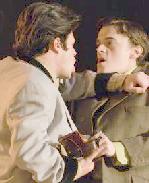SITE GUIDE
SEARCH
REVIEWS
FEATURES
NEWS
Etcetera and
Short Term Listings
LISTINGS
Broadway
Off-Broadway
NYC Restaurants
BOOKS and CDs
OTHER PLACES
Berkshires
London
California
New Jersey
DC
Philadelphia
Elsewhere
QUOTES
TKTS
PLAYWRIGHTS' ALBUMS
LETTERS TO EDITOR
FILM
LINKS
MISCELLANEOUS
Free Updates
Masthead
Writing for Us
A CurtainUp  London Review
London Review
 London Review
London ReviewAbsolute Beginners
by Neil Dowden
|
In all of London's history there's never been anything like us. . .teenagers!
---- Photo Boy
|

Richard Frame as Ed the Ted and Sid Mitchell as Photo Boy
(Photo: Press at the Lyric Hammersmith) |
The book was turned into a disastrous film musical in 1986 by Julien Temple, starring the likes of David Bowie, Ray Davies and Patsy Kensit. Ironically, this stage adaptation by Roy Williams (best known for his play about football racism, Sing Yer Heart Out for the Lads) would probably have worked much better as a musical than a straight play. The show is so stylized and episodic that you expect the performers to break out into song.
The considerable talents involved promise much: director/choreographer Liam Steel has a background in physical theatre and dance, including the experimental DV8 ensemble; designer Lizzie Clachan works with the innovative company Shunt; and Soweto Kinch is an acclaimed jazz alto saxophonist/composer. Unfortunately the result is a stylish production that looks and sounds great but lacks any real dramatic or emotional impact.
The thin storyline revolves around David Bailey-style wannabe Photo Boy's (Sid Mitchell) efforts to earn enough money to satisfy the expensive tastes of his sexy material girl Suze (Joanne Matthews). If he can't get hold of £500 pronto she will feel free to continue to sleep with anyone else she fancies. His hopes are raised when he starts working for a media company who want him to capture the new free teenage spirit of London, but disillusion sets in as corporate capitalism and rabid racism rear their ugly heads.
As well as a portrait of the birth pangs of a new Britain, this is a coming of age story for Photo Boy, the unnamed narrator of the novel. In addition to trying to keep the unfaithful girl he loves, he has to cope with a dying father and a neglectful mother, and be true to his tolerant and optimistic beliefs in an egalitarian society free from prejudice, where people need not be ashamed of their colour or sexuality. While mixing with a cool crowd in coffee bars and jazz clubs, he also becomes embroiled in the gang warfare between teddy boys and "spades" (Afro-Caribbean immigrants) that culminates in the violent Notting Hill riots of 1958.
Williams preserves the flavour of MacInnes's writing but fails to find a focus for his kaleidoscopic images of intergenerational conflict and imminent social revolution. Steel's direction is admirably fluid but lacks genuine dynamism — the show somehow feels flat and uninvolving. However, Clachan's multi-level set is extraordinary — predominantly black and white mobile blocks with ladders and steps, on which the performers move up and down with an impressive ease which suggests sexual freedom and social mobility. And Kinch's super-cool bebop-style soundtrack creates exactly the right ambience for this milieu.
Overall the performances, it has to be said, are weak. Although sympathetic, Mitchell lacks charisma in the main role, so that he comes across as passive and petulant rather than daringly progressive. Matthews certainly looks the part of a girl prepared to use her sex appeal to get what she wants, but it's a one-note performance, while Micah Balfour has little more to do than to live up to his name as Photo Boy's Jamaican friend Mr Cool.
David Sibley does well in his dual roles as Photo Boy's downtrodden socialist Dad and exploitative media mogul Vendice, and Tom Stuart also shows impressive versatility as the sleazy pimp Wiz and the self-dramatizing gay Hoplite, who delivers an entertaining 'youth manifesto' straight to camera during a TV interview — one of the few moments when this show really comes alive..
|
ASOLUTE BEGINNERS
By Roy Williams, adapted from Colin MacInnes novel Directed by Liam Steel Starring: Sid Mitchell, Joanne Matthews, Micah Balfour; with: James Clyde, Richard Frame, Darren Hart, Tosin Olomowewe, Rachel Sanders, David Sibley, Tom Stuart Music: Soweto Kinch Design: Lizzie Clachan Lighting: Guy Hoare Sound: Nick Manning Running time: Two hours (including 15 minutes interval) Box Office: 0870 050 0511 Booking to 26th May 2007 Reviewed by Neil Dowden based on 3rd May 2007 performance at Lyric Hammersmith, King Street, London W6 0QL (Tube: Hammersmith) |
|
London Theatre Tickets Lion King Tickets Billy Elliot Tickets Mary Poppins Tickets Mamma Mia Tickets We Will Rock You Tickets Theatre Tickets |




